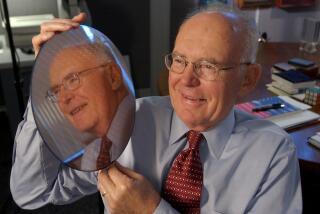Agency Shifts Stand on Award of Chip Patent
- Share via
The U.S. Trademark Office, reversing a decision last July, has decided to review whether a controversial patent awarded to La Palma inventor Gilbert P. Hyatt should instead be granted to a former Texas Instruments engineer.
The proceeding, known in official jargon as an interference, will focus on who was first to invent the computer-on-a-chip--the brain of all electronic equipment from microwave ovens to pocket calculators.
In July, 1990, after a 20-year legal ordeal with patent examiners that resulted in an estimated 10,000 pages of paperwork, the patent office gave Hyatt official recognition for his work in 1968 toward development of a family of chips now known as microprocessors.
The patent award shook the multibillion-dollar semiconductor industry because it effectively gave Hyatt the right to seek millions of dollars in royalties from semiconductor companies that make products based on the technology covered by the patent. The award also called into question the industry’s official history, which had credited researchers at Texas Instruments and Intel Corp. with the invention of the microchip.
Texas Instruments issued a statement Tuesday saying it believes that former TI engineer Gary W. Boone should be regarded as the pioneer of the computer-on-a-chip, based on work he performed in 1971. An amended patent filing by TI and Boone prompted the patent office’s decision to review the Hyatt patent.
In deciding to review the patent, the patent office changed the effective date of Hyatt’s patent filing from December, 1970, to December, 1977, and granted Boone a filing date in 1971. Patent attorneys said the inventor with the earlier filing date will ultimately prevail in any patent dispute.





